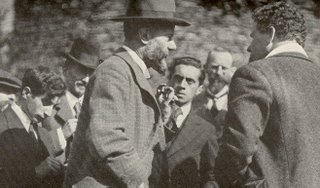

Bureaucracy is an ideal type created by Max Weber.
An ideal type is an overly rational method of analyzing a social
phenomenon, and is "used to analyze the social world in all its
historical and contemporary variation" (Ritzer, p. 36). Ideal types
contain certain characteristics that are used to measure how well
specific examples fit into them. The specific examples do not need to
possess any or all of the characteristics of the ideal type, because
comparisons between the examples determines how well they fit into the
ideal type (Ritzer, p. 37).
Weber outlined six characteristics for a bureaucracy (Farganis, p. 89-90):
| 1. Employees are given specific duties. The way they perform these duties is governed by a set of laws or regulations. If matters of government are concerned, the organization is a bureaucratic agency, and the organization is a bureaucratic enterprise if matters of private business are concerned. |
| 2. There is an established hierarchy where higher offices supervise the lower offices. If a lower office has a problem, it brings questions to the office a level higher. |
| 3. Management is based on written document. The private life of workers needs to be kept separate from working life (the home should not be the office, work relationships should not travel outside the office, and office money should not be used for personal use). |
| 4. Specialized office management is achieved after thorough training in a field of specialization. |
5. Focus should be solely on work while at work. |
| 6. Management follows general rules that can be learned and are relatively unchanging and thorough. |
A seventh characteristic added by C. Northcote Parkinson is the predictable growth rates in staff and management occur no matter how much work needs to be done. This characteristic of workers making more work for each other is known as Parkinson's Law (Johnston).
Bureaucracy is built around rationality, specifically formal rationality. It emphasizes the use of rules and laws that require people inside and outside of the bureaucracy to go through what may seem to be an unnecessary and unending string of processes (Ritzer, p. 31-32). This is seen as an inconvenience to most, but it is necessary to keep the bureaucratic system active and rational. A long string of offices to go to and forms to fill out ensure everything is documented and kept in order. It takes more work for both the bureaucratic workers and the outsiders who request service, but information is systematically moved and stored for later referencing.
Bureaucracies are guided through rational-legal authority where leaders hold positions through a set of recognized rules and regulations (Ritzer, p.40). The upper-level manager of a corporation is in that position because he/she was appointed there by a superior after following a certain set of guidelines and now has power over subordinates.
Weber thought this kind of rationalization changed the physical aspects of people's everyday lives to an iron cage-like environment. Rationalization spreads through more and more parts of life that it is eventually nearly impossible to escape. Charisma is overtaken by the modern, rational way of thinking (Ritzer, p. 40). Today, a person going to buy a car is most likely to be interested in the price, the features, how well it drives, mileage and history, etc. A salesman's charisma likely has a minimal effect on the outcome of which car is bought (unless he saves the person money).
Bureaucracy has become an accepted part of U.S. society. Films like Brazil illustrate the advantages and (mostly) the disadvantages of bureaucracies. |
The iron cage of bureaucracy has constricted Western society at an increasing rate as it continues to globalize and rely more on technology. Old traditions and ways of thinking have been altered to accommodate this. Weber explains that bureaucratic rationalization "first changes the material and social orders, and through them the people, by changing the conditions of adaptation, and perhaps the opportunities for adaptation, through a rational determination of means and ends" (Weber, p. 1116). Bureaucracy changes the environment people live in by making them go through a series of seemingly irrational set of rules and paperwork to get things done. Over time, people start thinking this is the rational way things are supposed to go, and bureaucratic processes become tradition. It is hard to undo the effects of a bureaucracy once society has adapted to this new process of rationalizing everything through a set of rules.